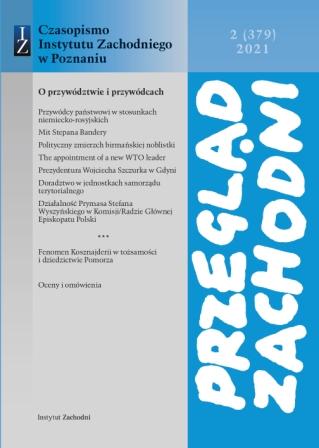Działalność Prymasa Polski Stefana Wyszyńskiego na forum Komisji/Rady Głównej Episkopatu Polski (1949-1953, 1956-1981)
The activity of the Primate of Poland Stefan Wyszyński in the Commissions and Presidium of the Polish Episcopal Conference (1949-1953, 1956-1981)
Author(s): Michał BiałkowskiSubject(s): Christian Theology and Religion, Political history, Post-War period (1950 - 1989), History of Communism
Published by: Instytut Zachodni im. Zygmunta Wojciechowskiego
Keywords: Cardinal Stefan Wyszyński; Primate of Poland; Episcopate of Poland; Presidium of the Polish Episcopal Conference; The Polish Episcopal Conference; Catholic Church in the Polish People’s Republic;
Summary/Abstract: The aim of the paper is to present the leadership role of the Primate of Poland, Stefan Wyszyński, in the Presidium of the Polish Episcopal Conference (1949–1953, 1956–1981). The main research problem is the description of Cardinal Wyszyński’s participation in the work of the Presidium of the Polish Episcopal Conference, his impact on this assembly and the assessment of the effects of his activity. The following hypotheses can be formulated: 1) in the analyzed period, Stefan Wyszyński had a key influence on the activities of the Presidium of the Polish Episcopal Conference; 2) activities undertaken by Stefan Wyszyński in the Polish Episcopal Conference were of decisive importance for the relations between the state and the Church; 3) Stefan Wyszyński undertook multi-directional and multi-faceted initiatives. Research based on the historical (genetic) method and content analysis allows the author to present the following factual data. Cardinal Stefan Wyszyński played a crucial role in the post-war history of the Catholic Church in Poland. After being appointed Primate, he served as President of the Polish Episcopal Conference in the years 1949-1953 and 1956-1981. Since 1969, he had also chaired the Presidium of the Polish Episcopal Conference and the main tasks of this body under his leadership included: 1) development of projects, schemas and guidelines to pastoral letters and other public addresses of the Catholic Church; 2) an analysis of the current situation of the Catholic Church; 3) coordination of the activities of other committees and sub-committee of the Bishops’ Conference. Taking into account the basic directions of work of the Polish bishops, resulting from the social and political situation in those times, issues being strictly under the control of the President of the Presidium of the Polish Episcopal Conference can be defined. Cardinal Stefan Wyszyński was personally responsible for: 1) specifying the main directions and contents for pastoral teaching; 2) shaping relationships with the authorities of the Polish People’s Republic (PRL); 3) managing the personnel policy of the Episcopate in its part concerning the nomination of bishops; 4) initiating changes in the organisational structure, objectives, tasks and the legal status of the Polish Episcopal Conference. These problems are discussed in more detail further in the paper, although it should be emphasised that they do not exhaust the extensive range of issues for which the President of the Presidium of the Polish Episcopal Conference was responsible. Among others, the following issues were not analysed: 5) coordination of contacts with the Holy See and foreign episcopal conferences, and 6) a strict control over the process of reception and implementation of the resolutions of the Second Vatican Council. Cardinal Stefan Wyszyński’s contribution to the activities of the Presidium of the Polish Episcopal Conference still remains an issue that requires a comprehensive, complete and exhaustive study. Indeed, it is not possible to understand the processes that took place in the Catholic Church in Poland and its relations with the Communist state without this fundamental knowledge.
Journal: Przegląd Zachodni
- Issue Year: 379/2021
- Issue No: 02
- Page Range: 127-152
- Page Count: 26
- Language: Polish

